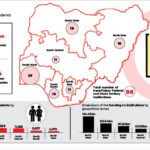The Lake Chad Basin Commission (LCBC) member countries, led by Nigeria, have agreed to recharge Lake Chad by constructing a 2,500 kilometre long navigable channel, to bring water to the Lake from the Congo Basin that is in the Democratic Republic of Congo (DRC).
It is estimated that an amount in the region of $30 billion-$50 billion may be required to develop this channel, including about $600m for Engineering Studies, Design, Project Management and Environment Impact Assessment (E.I.A) studies.
Efforts to mobilize the required funding is in progress, but we foresee this may not be available in the coming years, if not decades. It may remain a mirage.
Meanwhile, we believe the Federal Government can channelize and use the water from Rivers Niger and Benue that cause perennial flooding in many states of the country, to gradually refill the Lake via the Hadejia – Jema’are – Komadugu – Yobe River, which currently contributes about three-percent (3%) of the flow into the Lake. Other tributaries will actively contribute if properly channelized to feed into the major artery feeding this lake.
In essence, we are requesting the Federal Government to consider widening and deepening (i.e; dredging) Rivers Niger and Benue, to end the annual flooding caused by siltation in them; then use part of the water in these widened and deepened rivers, to refill Lake Chad.
This will be a case of government ‘killing two birds with one stone’ – ending seasonal flooding and refilling Lake Chad, concurrently.
In respect of this, we are happy to inform government, we, the proponents of this Solution, are able and available to provide all the Professional support needed for implementing this solution – hence, we call it ‘a domesticated solution’ – a solution developed by Nigerian Engineers based on using water taken from within Nigeria.
Other benefits the country will derive by adopting this domesticated solution, include:
1. All of River Benue that is within Nigeria, will become navigable
2. A good segment of River Niger will become navigable within Nigeria.
3. The Hadejia-Jema’are-Komadugu-Yobe River will become navigable
4. It is expected the soil removed from the rivers by dredging, can be used as top soil in agricultural fields or the for construction.
5. The widened and deepened Hadejia-Jema’are-Komadugu-Yobe River, can be used to develop the Nguru wetlands for all-year-round agriculture-crop and animal farming
Why River Niger instead of the Congo River
River Niger which is about 4,200 kilometres long, is the third longest river in our Continent. From its source at an elevation of about 800 metres above the sea level in the Fouta Djallon highlands that is in the Republic of Guinea, it flows into the Atlantic Ocean through Guinea, Mali, Niger, Benin and Nigeria. Also, watersheds in Cote d’ivore, Burkina Faso, Chad and Cameroon, contribute to the flow in the River.
Hydrological data from the Nigeria Hydrological Services Agency (NHSA) shows, Nigeria which is geographically located downstream of Rivers Niger and Benue, has in recent years, experienced floods during the months of August, September and October – so far, the worst (on record) occurred in 2012, when a discharge of 31,000 cum/sec was measured.
Furthermore, the data convinced us, the section of River Niger that is within Nigeria can be a good source of Recharging the Shrinking Lake.
It is the opinion of the proponents of this paper, that using River Niger to recharge the Lake will bring abundant benefits to the country, this can include, turning the Sambisa forest which is presently a hideout of criminals, to an Agricultural Area, in addition to the other benefits listed in the Executive Summary.
The benefit to the country can also include turning the Nguru wetlands, which is presently a marshy area outgrown with wild grass, into a productive agricultural area.
Advantages of Recharging Lake Chad through River Niger instead of River Congo
1. The Estimated Capital Expenditure (CAPEX) for this ‘domesticated solution’, is about USD1.5 – 2.5 billion – which is less than 5% of the USD30-50 billion the member states of the LCBC are looking for, to construct a 2,500 kilometres navigable channel between River Congo and Lake Chad
2. River Niger originates & flows through the countries of the Lake Chad Basin Commission (LCBC), therefore the likelihood of future political interference remains very remote.
3. Existing dams within Nigeria can be integrated with the water transferred from River Niger.
4. Mitigation of floods and Drought within the country.
5. Availability of Navigable Inland Waterways within the country.
6. Mitigation of effects of the worldwide climate change and southern movement of the Sahara Desert.
7. Possibility of developing the Nguru wetlands to an extensive agricultural area for crop, vegetable and livestock farming.
8. We can integrate existing Irrigation hydraulic structures to support the entire people of the sub-region.
9.The $600M required for the feasibility studies of the proposed ‘River Congo to Lake Chad’ solution, becomes part of the CAPEX for this ‘domesticated solution’.
Conclusion
Since the water in River Niger belongs to the member countries of the Lake Chad Basin Commission (LCBC), using the river to recharge Lake Chad is more secured than taking water from River Congo. Also, water from River Congo can come along with a variety of ecological challenges, including foreign diseases that can destroy our aquatic lives and even humans. Furthermore, it is possible the DRC authorities may demand for annual compensation that can be in Millions of USD, in future, thereby adding annual recurrent & overhead costs to the project.
We therefore, strongly, recommend that the Government of Nigeria, pause and take a look at this alternative Solution, a Flood Water Conservation Option, (domesticated solution), for which we are available to provide amplification and guidance, that is cheaper and more cost effective, than continuing with the worldwide effort being made currently to mobilize about $30 – $50 billion for the transboundary River Basin Water Transfer to Lake Chad from River Congo, which may remain a mirage for a very long time to come.
A joint paper by Engr. Mustafa Bello, FNSE, Engr. B.O.E Adebosin, MICE, and Engr. Ibrahim Olomoda, FNSE [email protected]

 Join Daily Trust WhatsApp Community For Quick Access To News and Happenings Around You.
Join Daily Trust WhatsApp Community For Quick Access To News and Happenings Around You.


